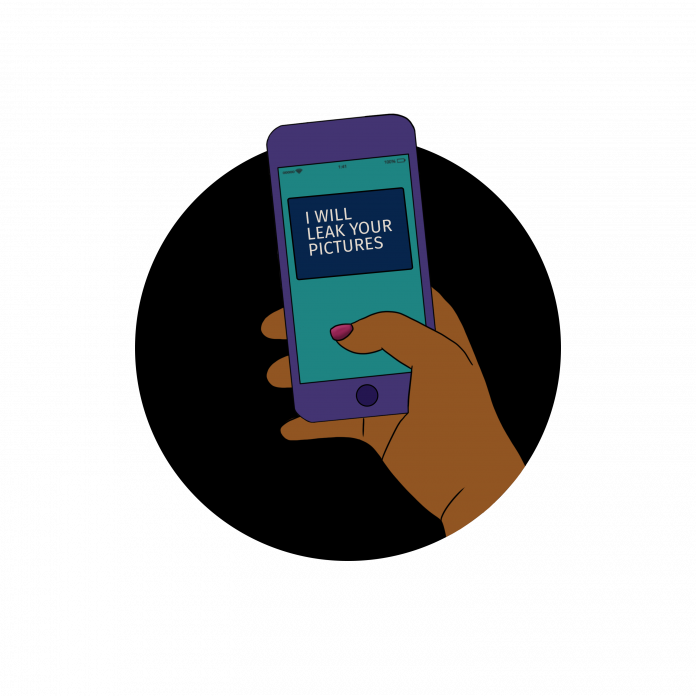By Areej Akhtar
“Everywhere I went, I felt the weight of a man’s eyes on me, watching, watching my body despite the layers of clothing. I would drape myself in a large chadar and still feel naked.”
Sania was sixteen when she started seeing the boy who would later on go to circulate the intimate pictures she had consensually shared with him in the entire school, ruining what were supposed to be the best years of her life. “We had been physically intimate, but I had certain boundaries. Like all Pakistani women, I too had internalized the taboo associated with female sexuality. Unlearning was hard, and I was not prepared to do a lot of things he demanded. So we called it quits,” she says. For a while, the termination of the relationship did Sania well. She finally felt like she could explore her sexuality on her own terms and at her own pace, without being beleaguered by the incessant demands of a man who had little or no sensitivity to the tumultuous vortex of emotions she was experiencing as a young Pakistani woman trying to own the sexuality she had long been forced to annihilate. But Sania, whose name has been changed to protect her identity, never anticipated that the sexuality she was fiercely trying to salvage would be weaponized and used against her.
“I did not see it coming at all. It had been two years since the break-up; I had buried his memory in the recesses of my mind. It was the annual batch trip, and we were coming back from Islamabad. On the bus ride home, someone suggested that we should play a game; “Never Have I Ever.” For a while, we all took turns searching up the lewdest and the most scandalizing questions on Google because, well, with teenagers everything has to be about sex, until someone said, “Never have I ever sent nudes to someone.” When it was my turn to speak, I calmly said “I haven’t,” and a roar of laughter erupted from the boys, some of them yelling “Come on, don’t lie!” I remember the entire ride home I felt like someone had snatched the clothes off of my body. For the next two years of my life, I would feel that way wherever I would go.”
Sania never confronted her ex regarding the pictures; she felt too humiliated to even speak to him, or anyone at all, for that matter. “I could not even talk to any of my friends, because the only response I would have gotten was ‘But why did you send him a picture in the first place? Don’t you know boys are like that?’ So for the next two years, I silently went about my life, all the while thinking that every single man in Lahore had seen my bare breasts. It made me want to kill myself,” she tells me.
While Sania never spoke to her ex-boyfriend again, she believes that he had leaked the pictures out of vengeance, because she had denied him sexual pleasure multiple times before finally breaking things off with him. “Even when we were together, he had voiced his discontent at my decision to not participate in sexual acts with him very vociferously. Leaking the pictures was a form of retaliation, a punishment for not complying with his demands. Like most men, he too could not live with having been refused something by a woman,” she explains.
Sania is now twenty-two, currently pursuing a degree in Marketing and Finance from the Lahore School of Economics (LSE). Like most Pakistani women, she too quietly dealt with the emotional and psychological trauma that this form of technology-facilitated gender-based violence inflicted upon her. She could not talk to a friend for she feared her decision to strip and take a picture for a man would be deemed too morally devastating to invite any sympathies. Moreover, in a country like Pakistan where women are expected to conform to specific standards of propriety and where honor killings are rampant, she did not have the luxury of confiding in a therapist or counselor either. “I just waited for the fear and the trauma to mitigate, it was all I could do anyway,” she tells me.
While she has been in what she deems a fairly healthy and egalitarian romantic relationship for more than three years now and acknowledges being physically intimate with her boyfriend, she claims she has never since clicked a revealing picture of herself. “I don’t think I can ever do it again, no matter how much I trust or love a man. Enough of my body has been paraded around in Whatsapp and Messenger group chats for men to see,” she says.
Sania is one of the many victims of “revenge porn,” an apparition that discreetly haunts the lives of countless Pakistani women who frequently find themselves at the mercy of an ex-partner in possession of a few intimate pictures who could seal their death by merely clicking “Send.”
The term “revenge porn” refers to the non-consensual distribution of the sexually explicit pictures of a person shared during an intimate relationship in an attempt to blackmail, intimidate, humiliate, harass, coerce into reconciliation, or punish for terminating the said relationship. It can also refer to the practice of doctoring images to achieve the aforementioned motives or installing hidden cameras to discreetly and non-consensually film your partner while the two of you are engaged in a sexual act to leak those recordings later on either for commercial gains or with the intent of disgracing the victim. Revenge porn comes under the broad category of what U.K scholars Claire McGlynn and Erika Rackley (2017) define as “image-based sexual abuse,” which refers to the non-consensual creation and distribution of private sexual images. With a mounting increase in our reliance on digital communication, especially since the pandemic, cases of revenge porn too have exacerbated amidst other forms of technology-facilitated gender-based violence.
While both men and women can be victims of revenge porn, it is essentially a gendered phenomenon since not only men are more often the perpetrators and women the victims, but the latter are also confronted with more formidable repercussions. In Pakistan, a woman’s body has always been a vessel for safeguarding the “honor” of the men in her life. When a woman uses her body in a way that defiles the “honor” she is charged with the duty of guarding by virtue of her biological sex, she often pays the price with her life. In a country where sisters are strangled to death by their brothers for wearing revealing clothes, where wives are butchered and dumped into rivers by “dishonored” husbands for being suspected of having an extramarital affair, where daughters are ousted from their fathers’ houses for having a harmless dalliance with a boy, all it takes is one picture for a woman to be ruined. It was this fear that gripped Ammara’s heart when she received a call from an unknown man informing her that her sexually explicit pictures were all over the Internet.
“I was out with my family for dinner when my phone rang; it was an unknown caller ID. When I picked up, the man on the other line said, “agar family key saath bethi hou tou dou minute side par hokar baat karlo, bohat zaroori baat hai. Tumhari izzat ka maamla hai.” I knew that my pictures had been leaked even before he told me, a random man who had gotten hold of my phone number and social media handles from the Internet alongside the pictures which God knows how many men had seen. It made me sick to my stomach. Suddenly, it felt like my clothes were not enough. As if every man in the restaurant could see past my dupatta and my kameez, could stare right at the nakedness which was now splashed all over the Internet. I remember looking at my father and thinking, “What if he also comes across those pictures too?” He would kill me with his bare hands. To him, a dead daughter was better than a disgraced daughter,” says Ammara, whose name has been changed to protect her identity.
Currently doing her A-Levels from LGS Defence Phase 1, Ammara was in her O-levels when she first clicked the pictures that she still feels are sungsinged in the memory of every man she has ever seen. “If I am doing my groceries or buying something at the pharmacy and a man looks at me for longer than a minute, this voice in my head suddenly starts screaming, “Oh God, he recognizes me, he’s thinking, “That’s the girl whose pictures I had seen,” and I feel like digging a grave and burying myself in it right there and then,” she says.
For Ammara taking those pictures had been an act of defiance, her private little revolution against a set of parents who had robbed her of all agency over her body by subjecting it to incessant policing. “When my breasts started developing a little, my mother would shroud my entire frame in a large chadar, almost rendering me invisible. I remember I once bought a cropped top that was really lovely and accentuated my breasts, making me feel powerful and feminine. When my father saw it, he burnt it and forbade me from wearing anything wahiyat again. The first time I took a picture and sent him to my then-boyfriend it wasn’t for him as
much as it was for me. After all that time of being made invisible in large chadars that I felt imprisoned in, I just wanted to be seen,” she says.
Like Ammara, many young Pakistani girls have sought to vindicate their bodies from the clutches of patriarchal control and reclaim bodily autonomy by taking, posting, or sharing pictures in which they actively decide how they want themselves and their bodies to be seen. Burdened with the weight of the entire family’s “honor,” they are seduced by the promise of autonomy and liberation that the digital world, divorced from persistent parental policing, offers them. For many women, the decision to consensually reveal their bodies to a partner through a picture or a video is the only way of claiming ownership of their bodies and sexualities that they are vehemently denied in the non-digital world. For men, these pictures may be nothing more than objects of sexual gratification, but for women, they serve as radical reminders of the autonomy they possess over themselves and their bodies despite society’s relentless attempts to rob them of it. “When I sent him the first picture, I remember feeling freer, more in control. I remember thinking to myself, ‘sure, my parents make a lot of choices for my body, my father decides the length of my dupatta and my mother decides the color of my bra, pastel, never red or black or blue or any color that would draw attention, but that does not mean I cannot make any choices whatsoever.’ I had relished the feeling of knowing that for the first time in my life, I had chosen for my body, instead of having something chosen for it,” Ammara explains.
For many women, the digital world becomes a sort of sanctuary where they can choose to be seen however they want to. However, the menace of revenge porn transforms the digital haven into a sort of panopticon for them, imprisoning them in a multitude of websites, pages, and group chats where they are always being seen by someone, never knowing for sure who, if anyone, is seeing them. “It’s like you know when they say, ‘be careful what you wish for.’ I wanted to be seen, and now I know for a fact I am always being seen. Even secure within the walls of my room, I feel like I am being seen. Somewhere some man is looking at my naked form on his screen. Just because I had consented to be seen by one man does not automatically mean I also consented to be seen by other men too,” Ammara says.
Asmer Jawwad, a twenty-one-year-old student from FCCU, explains that revenge porn is motivated partially by the vengefulness of a man who feels wronged or betrayed, and partially by peer pressure in a culture where hypermasculinity is championed and men are encouraged by their male friends to “punish” a woman for “wronging” them. “It’s very much like locker-room talk. One of the boys will mention his break-up, and someone will go, ‘You got any pictures or videos of her, bro? Send them over, I’ll make sure all of Lahore knows what a slut she is. When men are jacking off to her pictures every night, she’ll come begging for your forgiveness on her knees,’ and if you refuse to do so, you are labeled a ‘weakling’ or ‘not man enough’ for wanting to protect a woman’s dignity,” he says.
While Pakistan’s ground-breaking Cyber Crime Bill, passed in 2016, criminalizes the non-consensual doctoring or distribution of a person’s sexually explicit images “to take revenge, or to blackmail, or to create hatred,” with up to five years in prison and a fine of up to five million rupees, cultural taboos and administrative inefficiencies prevent many women from prosecuting their offenders. Those who do muster up the courage to do so are not met with any success either, as proven by the ongoing case of Wishah Abubakar against her husband, Shahzawar Bugti, son of late Nawab Akbar Bugti, who leaked her private pictures and also subjected her to physical and sexual violence. Recently, Wishah tweeted that despite being put on the ECL, Shahzawar was leaving Pakistan with the assistance of FIA Immigration, proving that while the law may seem like adequate protection for women on paper, in a country where the judicial system and the police force are dominated by men, it is essentially just that; adequate protection on paper.
For many Pakistani women, digital communication is the only form of communication they can have with a person of the opposite sex as pre-marital relationships are often fiercely condemned, making a Whatsapp chatbox or Instagram DM the only place where a woman can interact with a man. In these virtual settings, away from the prying eyes of intrusive elders, women often find a false sense of privacy and security that is ruthlessly shattered by a single man’s decision to share her private pictures in a Messenger group chat. From there on, the damage is often unsalvageable, as the pictures are transmitted across several distribution links that are too difficult to monitor or suppress. As Sania says, “It’s like at any given moment, some man, somewhere, is clicking on my picture, watching it, saving it, and then forwarding it to his friend. The chain of humiliation never ends.”






